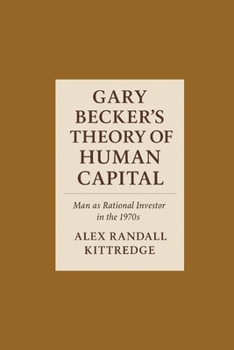Gary Becker's Theory of Human Capital: Man as Rational Investor in the 1970s
This essay focuses on Nobel Prize winning economist Gary Becker (1930-2014) and his economic theory of man's rational investment in him/herself as "human capital" with an emphasis on the development of human capital in the 1970's.1 Gary Becker's economic thought has influenced the trajectory and methods of twentieth-century social science, with continued resonance today. However, despite passing references to Becker's breakthrough theory of "human capital", few authors engage with the substance of Becker's unique conception of man as human capital. Instead, references to Becker's thought in social science literature widely accept the economic premises of his concept of human capital, and subsequently their radical implications for sociology and political science.
Related Subjects
History




